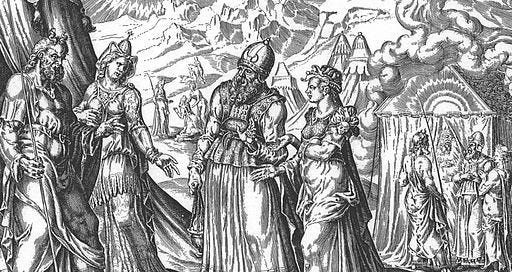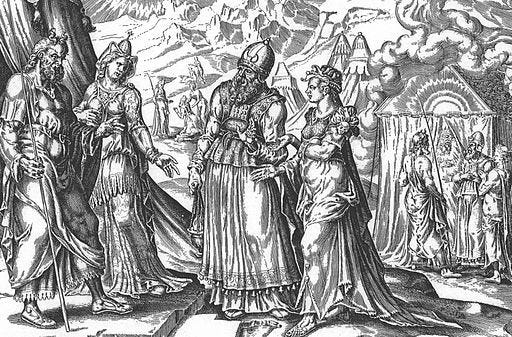(The Catholic Edition of the Revised Standard Version of the Bible, copyright 1965, 1966 by the Division of Christian Education of the National Council of the Churches of Christ in the United States of America. Used by permission. All rights reserved. Image credit: Wikimedia Commons, public domain.)
Miriam and Aaron spoke against Moses because of the Cushite woman whom he had married, for he had married a Cushite woman; and they said, “Has the Lord indeed only spoken through Moses? Has he not spoken through us also?” And the Lord heard it.
Now, the man Moses was very meek, more than all men that were on the face of the earth. And suddenly the Lord said to Moses, and to Aaron and Miriam, “Come out, you three, to the tent of meeting.”
And the three of them came out. And the Lord came down in a pillar of cloud, and stood at the door of the tent, and called Aaron and Miriam; and they both came forward.
And he said, “Hear my words: If there is a prophet among you, I the Lord make myself known to him in a vision, I speak with him in a dream. Not so with my servant Moses; he is entrusted with all my house. With him I speak mouth to mouth, clearly, and not in dark speech; and he beholds the form of the Lord. Why then were you not afraid to speak against my servant, Moses?”
And the anger of the Lord was kindled against them, and he departed; and when the cloud removed from over the tent, behold, Miriam was leprous, as white as snow. And Aaron turned toward Miriam, and behold, she was leprous.
And Aaron said to Moses, “Oh, my lord, do not punish us because we have done foolishly and have sinned. Let her not be as one dead, of whom the flesh is half consumed when he comes out of his mother’s womb.”
And Moses cried to the Lord, “Heal her, O God, I beseech Thee.” But the Lord said to Moses, “If her father had but spit in her face, should she not be shamed seven days? Let her be shut outside the camp seven days, and after that, she may be brought in again.” So Miriam was shut up outside the camp seven days; and the people did not set out on the march till Miriam was brought in again.
Context: The book of Numbers takes up the story of the people of Israel after the Exodus from Egypt, but before they take possession of the Promised land. This story is confirmation that there was dissension and unhappiness among the rank and file as they struggled to survive in the desert.
Translation: Scholars believe that this book was written in the fifth century B.C., by priests concerned with explaining the many liturgical norms and sacrifices codified after the Jews returned from their exile by the Persians. It is one of the five parts of the of Jewish Torah, the books of the Law.
Vocabulary:
the man (Moses) was very meek: The plural in Hebrew for this word “man” is anawim, which has idealistic overtones of piety, while anayv (“meek”) connotes affliction, poverty and sanctity in suffering.
mouth to mouth: This expression is found nowhere else in the Hebrew scriptures. This speaks to the unique character of Moses’ relationship with God.
she may be brought in again: All lepers were considered unclean, and this is the basis of Miriam’s banishment, but it is clear from the context that God heals her, otherwise she would not have been allowed back into the camp.
Meditation: Brothers and sisters know all our dirt, don’t they? And envy seems to take up residence at every family dinner table. Despite clear evidence that Moses was God’s anointed, his imposed-upon siblings had to speak up, and air the dirty laundry, too. (Find me the political family without issues, please!)
Alas, God has plans for all of us much bigger than our petty complaints about one another. Not only does God clearly rebuke Miriam and Aaron, but places Moses in the position of delivering Miriam from her fate. After a short exile, she is welcomed back, cleansed of her ill will toward Moses. And the camp moves on.
Discussion Questions:
Have you ever been tempted to criticize a family member publicly? Did you? How did your relationship change as a result?
Although we aren’t the wandering tribes of Israel, we often need to “move on” after unpleasant family episodes. Especially at Thanksgiving, what can you do to be a peacemaker in your own “camp?”
Can families be cleansed by resolved conflicts? Humility leads to stronger relationships. Have you ever experienced a humbling episode that led to greater love? Tell about it.





